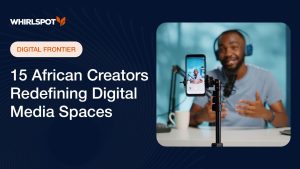Spend a few minutes scrolling TikTok and you’ll see them everywhere: dance challenges, street fashion, comedy skits, and freestyle music clips. African Gen Z audiences aren’t just consuming culture; they’re making it, and the rest of the world is paying attention.
Today every brand is chasing Gen Z but understanding them is complex. They’re digital-first yet deeply rooted in culture. They’re socially conscious, ambitious, and far less-patient with brands that “don’t get it.”
So, winning them over isn’t just about flashy ads, but about understanding their unique mix of exposure and identity.
This post explores what makes African Gen Z stand apart, and how brands can engage them in ways that are credible, relevant, and lasting.
African Gen Z audiences: Who Exactly Is African Gen Z?
Gen Z in Africa generally refers to people born between 1997 and 2012 (between 13 and 28 years old). That means the oldest are entering the workforce, while the youngest are still in secondary school. Together, they form a youth market larger than Europe’s entire population.
But they’re far from a single group. Their lifestyles vary widely across the continent.
For example, in Lagos, you’ll find young people streaming Afrobeat on Spotify and TikTok while in Nairobi, Gen Z entrepreneurs could be selling fashion items via Instagram and M-Pesa payments. In rural Ghana, young farmers trade crop tips in WhatsApp groups.
This diversity matters for brands, which explains why your message can’t be “one-size-fits-all.” It must be unified at the core but flexible in delivery across markets and lifestyles.
What Makes African Gen Z Different?
1. Economic Reality Meets High Aspiration
African Gen Z balances global tastes with local realities. They want iPhones and Nike sneakers, but many shop “sachet” products (small, affordable units), because affordability drives adoption. This mix of aspiration and pragmatism makes them sharp judges of value.
2. Tradition Blended With Global Culture
This is a generation that remixes tradition, rather than ditch it. You’ll see Ankara prints styled with sneakers, heritage festivals posted on Instagram, and memes that mix Yoruba proverbs with global pop culture. For brands, this means campaigns work best when they acknowledge local culture while speaking global relevance.

3. Mobile-First, Social-First
Unlike Gen-Zs in Europe or the U.S., African Gen Z skipped desktops almost entirely. They’re mobile-first, social-first consumers. TikTok, Instagram, WhatsApp, Spotify and Boomplay drive their media habits. They use phones not just for entertainment but for school, work, banking, and healthcare.
4. Activism and Authenticity
They are vocal. Take a cue from Nigeria’s #EndSARS and South Africa’s #FeesMustFall, these African Gen Z have shown their ability to mobilize digitally and offline. They expect brands to be socially aware and authentic. They’ll embrace a brand that supports education access or climate issues, but they’ll call out hypocrisy instantly.
Why This Matters for Global Brands
This generation is already reshaping Africa’s markets. They drive family purchase decisions, influence political conversations, and dominate pop culture.
Gen Z musicians are now Africa’s biggest global cultural exports, young founders are reshaping fintech, and youth-led communities are defining fashion trends – in Nigeria, Kenya, and Ghana respectively.
For global brands, ignoring African Gen Z means missing the audience that will decide which companies thrive in the next decade.
How Global Brands Can Reach African Gen Z
1. Localised Storytelling
Copy-paste campaigns don’t work.
A press release drafted in London or New York often falls flat in the African market. Instead, craft a unified brand story, then adapt it locally.
Take WellaHealth: when expanding from Nigeria into Kenya, its core message was “accessibility in healthcare.” But each market got its own storylines, visuals, and calls-to-action that reflected local needs.
2. Digital Meets Street Culture
African Gen Z lives online, but offline cultural moments still matter. Brands succeed when they blend the two. A Pepsi billboard at a Lagos concert, followed by influencer-led TikTok challenges, builds both credibility on the street and virality online.

That’s why Spotify and Coca-Cola pair billboards with social activations. In Lagos especially, billboards amplify digital reach.
Read: Billboards still work! Here are five use cases
3. Partner With Local Influencers and Communities
Trust in Africa often flows faster through local connectors than through global advertising. Gen Z listens to creators, community leaders, and micro-influencers who speak their language.
When fintech brand WorkPay entered Kenya, highlighting local founders and using Nairobi-based voices helped them feel authentic, not foreign.
4. Affordable Innovation Wins
Gen Z wants global-standard experiences, but affordability drives scale. That’s why lite apps, sachet packaging, and flexible payment options dominate. SHAREit Lite, for example, succeeded by designing with African data realities in mind.
Brands that design for affordability without compromising aspiration are the ones that scale fastest.
5. Show Up for Causes That Matter
Individuals within the Gen Z age bracket expect brands to stand for something, with special interest in youth employment, climate action, or digital access. With those, your brand’s role must be real. Tokenism fails. Real contributions like scholarships, sustainability projects, or creative collaborations earn lasting loyalty.
Case Examples
- WellaHealth: 100+ Tier-1 African media features within weeks by focusing on healthcare access, not just tech.
- MTN: Youth-focused campaigns built around music and education consistently strengthen its market leadership.
- TikTok Africa: Positioned itself not as a “global app” but as a stage for African creativity, empowering local creators.
Internal link: See how African press releases get picked up by media.
Final Word: Why African Gen Z Matters
African Gen Z isn’t just another audience segment. They are the world’s most important youth market; mobile-first, culture-shaping, socially vocal, and commercially influential.
For global brands, the choice is simple: treat Africa’s youth like a generic extension of global Gen Z, and you’ll fade into the noise. But treat them as the distinct, powerful audience they are, and you’ll unlock not just attention, but trust and influence.
Whirlspot Media helps brands craft campaigns that speak directly to African Gen Z with the right story, the right channels, and the right local touchpoints. Because if you can win Gen Z in Africa, you’re not just building a market. You’re building the future.





